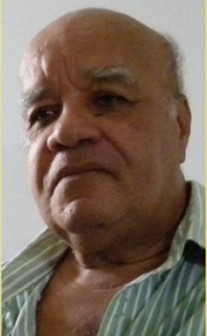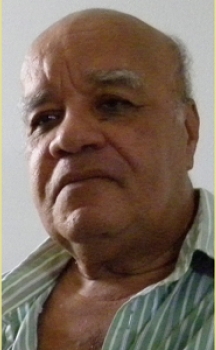(Barbados Nation) An elderly Barbadian is complaining about the treatment he says he received from the Immigration Department, which denied his application for a work permit to have a Guyanese take care of him.
Anthony Sealy, who lives in Belleville, St Michael, says it has taken almost five months to receive a definitive response from the department after getting the “runaround” – as well as losing his $300 application fee.

The problem Sealy encountered, however, was that the Guyanese man, Sonny Satrohan, had been asked to leave Barbados for overstaying his visit in 2009. When he sought to return a year later, he was stopped at the Grantley Adams International Airport and sent back home.
Parliamentary Secretary in the Prime Minister’s Office Senator Harry Husbands, under whose portfolio immigration falls, said while he would not speak on the particular case, generally the chances of a person who overstayed being granted a work permit were slim.
Sealy, a 69-year-old amputee and diabetic who lives alone, said he had been trying to have Satrohan, 25, stay with him to attend to his physical needs and repair his ageing and leaking home.
He said there were no relatives who could meet his current needs and employing a Barbadian “would not work out arithmetically”.
“The chap from Guyana would eat and live here and his wages would take into account boarding and lodging,” said Sealy, who has a prosthesis fitted to his left foot. “It would be good to have someone staying with me at night as I take off the prosthesis and am in a wheelchair at [that time].”
The retiree’s main beef is with Chief Immigration Officer Erene Griffith.
Sealy, who represented Barbados in basketball and hockey in the 1960s, told the SUNDAY SUN that in August, 2010, he wrote the immigration chief querying Satrohan’s treatment by the department.
Sealy, who previously worked with troubled youth in the ghettos of Notting Hill and Brixton, England, as a community social worker in the 1970s and 1980s, returned to Barbados about 15 years ago. Over the years he had rented rooms in a property on Bay Street, Bridgetown to non-nationals.
“This young man came to watch [World Cup] cricket here in 2007 and stayed with his brother in a house I once let,” Sealy reported.
He said Satrohan returned to Barbados to work as a labourer on the promise from his boss that he would get a work permit. That did not work out and Satrohan was sent back in 2009 for overstaying his visit.
“I didn’t hear from him until 2010, when he said he wanted to return for Crop Over, so I went to the airport to receive him,” Sealy said.
However, Satrohan was refused entry that July 25.
In a letter dated July 28, 2010, Sealy told Griffith: “Since my understanding is that after a year persons are eligible to return, I consider the action of refusing him entry for Crop Over unreasonable. . . .”
He said soon after his July letter he had a telephone conversation with the immigration chief and discussed his concerns.
“I wasn’t completely happy about the discussion,” he said, adding that he subsequently wrote Griffith [in August, 2010] “seeking answers as to why the Guyanese man was treated like that”. He also enclosed an email from Satrohan detailing his alleged treatment at the airport.
Sealy said after not getting a response by phone or letter, he let the matter rest, but his interest was rekindled when Shanique Myrie, a Jamaican national, alleged she was cavity-searched at the airport.
He tried contacting the immigration chief again.
“In early June, 2011, I emailed her a letter,” he disclosed. “This time, I not only pointed out the treatment at the airport, but I also suggested a way to deal with similar situations.”
Sealy suggested a system where it would not be left to an individual officer but rather a group to determine if a person should gain entry, “as many innocent people could suffer if that officer was having a bad day or [was] in a bad mood”.
Sealy said that nine days later he received a response from Griffith, suggesting they look at the option of applying for a work permit for the Guyanese.
That email dated June 11 stated in part: “I remember the case you speak of and remember that I called you when the letter was received and held a very long conversation with you in response to that letter. I was of the view that your concerns had been answered by that conversation. Accept my apology if I am mistaken.
“Am I right in thinking that your friend was refused entry because he had previously overstayed and possibly worked without a work permit? . . . If you wish to employ him as suggested in your email, a work permit application should be submitted for consideration. Please call me at the office . . . to discuss the matter.”
Sealy proceed to apply for a short-term work permit on June 27. He said that on June 30 his $300 cheque had already been cleared at the bank.
He added that months passed without a word on his application.
Phone calls and emails to the department were not answered, he charged.
Then last week, he received a letter from Immigration saying his application “has not been approved”.
But to his astonishment, the letter went on: “He [Satrohan] is required to make arrangements to leave the country within one (1) month of the date of this letter and thereafter remain outside of Barbados for a period of at least one (1) year.”
Sealy said: “The man hasn’t been here since they deported him in 2009 and yet they put that in the letter!”
He said he was uncertain as to the next step to take, but would have to reconsider his initial plans.
“My experience has been painful and frustrating,” he complained. “How long do you have to wait to hear whether a work permit has been approved? They could have told me earlier instead of wasting my time and giving me such runaround. They should not have subjected me to the stress of waiting, as well as having the young man waiting to hear something for so long as well.
“We in Barbados are gradually developing a reputation for arrogance and rudeness around the Caribbean . . .,” he said.
Efforts to reach Griffith for a response proved futile.
However, Senator Husbands told the SUNDAY?SUN non-nationals who had been asked to leave Barbados for overstaying their welcome started out with a major disadvantage when they sought to return for a visit, far less seeking a work permit.
“If you apply for a work permit for a person who had overstayed their time, it is most likely that application will be turned down,” he said, adding that the applicant would also forfeit the “processing fee”.

